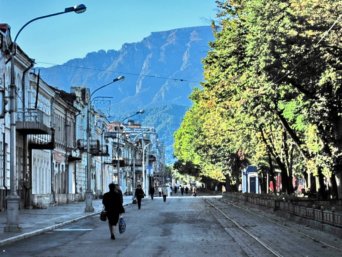- About
- Topics
- Story
- In-Depth
- Picks
- Opinion
- News
- Donate
- Signup for our newsletterOur Editors' Best Picks.Send
Read, Debate: Engage.
| topic: | Democracy |
|---|---|
| located: | Russia |
| editor: | Igor Serebryany |
Never previously seen type of activity with thousands of protestors gathering at online maps of their cities spreads like wildfire across Russia recently.
The action started initially as a semi-joking flashmob in the city of Rostov-on-Don in southern Russia. But it swiftly evolved into a full-fledge nationwide rally with demands to the local and federal authorities to either declare a formal emergency in the country or lift the restrictions and let people move and work freely.
The protesters employed the application of the Yandex, a Russian version of the Google Drive. They 'gathered' in thousands around government buildings and posted their demands in the chat boxes on the maps of Rostov, Yekaterinburg, Krasnoyarsk, Nizhni Novgorod, Voronezh, Saint-Petersburg, Ufa and Moscow.
Normally, those boxes serve the drivers to exchange information about traffic conditions.
While those regions rallied online, the republic of Northern Ossetia in the Russian Caucasus stood out of the crowd. Its 1,500 residents rallied offline Michigan-style at the republic capital's main square with the same demands as their online peers posted in the Yandex Navigator.
Police in Vladikavkaz broke up the rally, arresting several dozens of its participants. Meanwhile, Yandex's team undertook its own crackdown by deleting the off-topic messages from its driving application.
Russian authorities face the lose-lose choice for the first time in modern history, as both their activity and inactivity drive the Kremlin into the corner, a professor in sociology of the High School of Economics Alexander Gofman says.
"The authority face choice with no choice: either let people die from the coronavirus today or let them die from hunger tomorrow. Naturally, the authorities react at the most immediate threat but the population has different priorities. We often lament that Russian folk are quick to give up their rights and freedoms to the tsar. This is true – until the issue is some abstract political freedoms. Now we see that when it comes to personal rights, the people are not willing to live in prison, even if that prison is in their own homes", he says.
Gofman expects that the online rallies in the Yandex and offline meeting in Vladikavkaz might be the first signs of a brand-new protest movement. Such actions might grow stronger as more regions introduce restrictions on residents' movement.
"This is remarkable that the first offline rally took place in North Ossetia with its relatively lax restrictions compared to those in Moscow. This is because the economic situation in North Caucasus is way worse than that in Moscow and people there started feeling the threat of starvation earlier than in the capital", the professor explains.
The statistics provided by, ironically, Yandex, shows that the number of people staying at home decreases day after day in all Russian regions.
This is paradoxical that the authorities and population share the same goal in the current conditions but still are unable to find the common ground, Gofman notes.
"The authorities want to lift quarantine as eagerly as the protesters do. That moment will come when the possibility of people's starvation becomes higher than the possibility of a population extinction due to COVID-19. In essence, the protesters don't rally against the governors; they rally against coronavirus. But since the virus can't be influenced directly, they aim at the authorities as to the 'virus proxy'", Gofman says.
In the current situation, the authorities have to take mass meetings more seriously, even if held online, former Communication Minister, now head of the Information Democracy Foundation Ilia Massukh says.
"Though the slogans of the online protesters differ little from likes and dislikes in the social media realm, the authorities see its danger in people's capability to self-organize. Long self-isolation adds life to the online communities and they have been collecting more power than in 'peacetime'. Many economic and social processes are moving to the internet. One day, online self-organization will become self-governing and the authorities will lose control over people's lives", he foresees.
"The government understands that process could sideline the official political institutions, to Wikinize the policymaking. This is a new kind of democracy and the authorities have to react to its manifestations in real time. The Kremlin has been thoroughly monitoring social media not to let the 'Wikimocracy' become self-reliant", Massukh says.
On Tuesday, the governor of Northern Ossetia agreed to pay financial assistance to the people who have lost their jobs due to coronavirus restrictions. Thus, the republic's governor yielded to the demands of the protesters. This can serve as an example to the people in other impoverished Russian regions, the experts expect.
Image by Иосиф Короткий (Iosif Korotkij)

